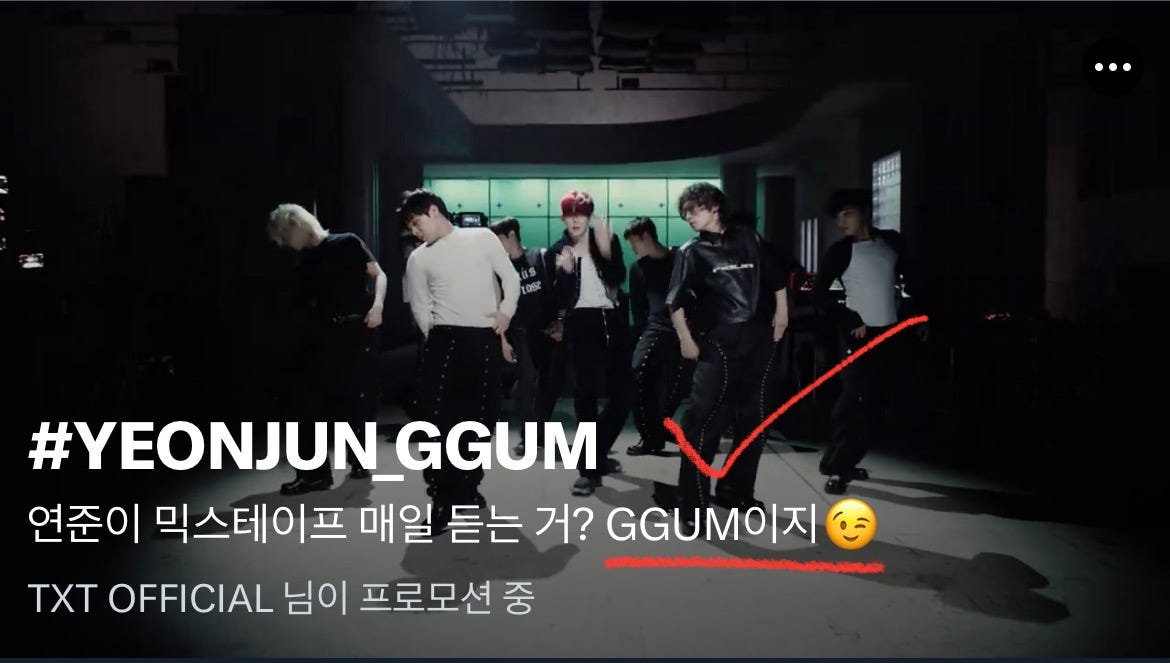안녕! It’s Ari, your chatty Korean friend and weekend reminder. 🎉 I took an unexpected break last week due to a lack of writing ideas, 🙃 but now I’m back and excited to share fun new stories with you! Today’s newsletter covers a top model’s diet, a new law, and how to say “it’s a piece of cake!” in Korean. Let’s dive in!
Seasoned Green Onion Salad with Boiled Pork

Han Hye-jin, a South Korean top model, recently shared some of her go-to meals in preparation for a commercial shoot. Among them was one dish that looked particularly mouth-watering, and I couldn’t resist sharing it with you! It’s seasoned green onion salad with tender boiled pork, or 파무침 with 수육 in Korean.
Koreans often enjoy seasoned green onion salad with all kinds of meat, whether grilled, boiled, or steamed. Think of it like ketchup with French fries—it’s a side that accompanies the meat wherever it goes. The fresh crunch and tangy seasoning of the green onions complement the savory richness of the meat, making it a perfect match. This light yet flavorful dish is a must-try for anyone who loves bold, balanced flavors.
Give it a try with the recipe below! While the model only provided a rough outline of the recipe in her video, I’ve added some details like ingredient measurements to make it easier for you to follow. You can watch her cooking video here.
For 1 serving,
Ingredients:
150-200g sliced pork neck (1-1.5 cm thick)
3-4 black peppercorns
2-3 bay leaves
1-2 stalks of green onion, thinly sliced
A pinch of salt
1/2 tablespoon sesame oil
A pinch of red pepper powder
1/2 tablespoon sesame seeds (optional)
Instructions:
Boil the Pork: In a pot, bring water to a boil and add the pork neck along with black peppercorns and bay leaves. Let it simmer until the pork is fully cooked and tender.
Prepare the Green Onion Salad: While the pork is boiling, slice the green onions thinly and place them in a bowl. Add a pinch of salt, sesame oil, red pepper powder (gochugaru), and mix well.
Cut the Pork: Once the pork is fully cooked, remove it from the water and let it rest for a few minutes. Then, cut the pork into bite-sized pieces.
Serve: Serve the seasoned green onion salad alongside the sliced pork. Optionally, sprinkle some sesame seeds for added flavor and texture. If you want to make it a more filling meal, you can serve it with steamed rice. Bon Appétit 😋
Why Seoul Dreams of Spring, Not Fall

The “Seoul Spring” Law was recently introduced in South Korea’s National Assembly to prevent potential abuses of martial law. Named after the term “Seoul Spring”—a hopeful but brief period of democratic aspiration between October 1979 and May 1980—this legislation was proposed by several Democratic Party lawmakers. It aims to impose stricter requirements for declaring martial law, including prior approval from over half of the parliament. The law also mandates that martial law declarations must be reviewed by the National Assembly within 72 hours and provides compensation for damages caused by unconstitutional enforcement.
The term “Seoul Spring” draws inspiration from the “Prague Spring” of 1968, symbolizing a fleeting moment when South Koreans believed democracy could emerge following the assassination of the dictator Park Chung-hee on October 26, 1979. However, the hope for democracy was crushed by the military coup led by General Chun Doo-hwan, which culminated in the brutal suppression of the Gwangju Uprising in May 1980. This historical backdrop resonates deeply with the proposed law, as lawmakers seek to prevent a similar crackdown on democracy.
The new law stems from growing concerns over the president’s plummeting approval ratings and increasing calls for his impeachment. Reports of secret meetings between the Chief of the Presidential Security Service, who has since become the Minister of National Defense, and high-ranking military officials have sparked fears of a potential martial law declaration to maintain power. The president’s recent appointments of ministers and military officers, many of whom share his Chungam High School background, have drawn comparisons to the private military networks that orchestrated the 1979 military coup. Lawmakers are determined to prevent history from repeating itself with this new legal safeguard.
The movie “Seoul Spring,”👆 based on these historical events, dramatizes the 9-hour period during which General Chun and his military faction seized control of Seoul in December 1979, effectively taking over the country’s military. It presents a tense conflict between the power-hungry coup leaders and the principled officers trying to stop them. The film attracted over 13 million viewers since its release in November 2023, becoming one of the most-watched films in South Korean history. Audiences were so emotionally stirred by the film that many took part in the “heart rate challenge,” sharing smartwatch data that showed their heart rates spiking during the most intense scenes. Though I didn’t have a smartwatch, I left the theater with shaking hands. 😡
Recently selected as South Korea’s entry for the Best International Feature Film category at the 2025 Academy Awards, “Seoul Spring” not only portrays a historical struggle but also serves as a timely reminder of the present. In the current political climate, the film feels eerily prophetic, reflecting ongoing concerns about potential martial law and the importance of safeguarding democracy. Now, “Seoul Spring” is set to represent the nation on one of the world’s biggest stages, offering both a cinematic triumph and a serious reflection on South Korea’s fragile democracy.
Mini Korean Lesson: Piece of Gum
Yeonjun of TXT, a popular K-pop boy group, recently released his solo debut song titled “GGUM,” which is how the word “gum” is pronounced in Korean. It’s written as “껌.” In a promotional post from TXT’s official account on X (formerly Twitter), it reads, “연준이 믹스테이프 매일 듣는 거? GGUM이지 😉,” 👆 which means, “Listening to Yeonjun’s mixtape every day? It’s a piece of cake!”
껌이지 (ggum-izi)
The phrase “껌이지” literally translates to “it’s gum,” but in casual conversations, it’s slang for “it’s a piece of cake” or “it’s easy peasy,” referring to something simple or effortless.
The expression “껌이지” likely originated because chewing gum is effortless, making it a fitting metaphor for easy tasks. In Korea, the act of chewing gum became linked with nonchalance, evolving into slang for tasks that are simple to accomplish. The phrase is now commonly used in everyday speech to describe things that are no big deal.
Funnily enough, the phrase “껌이지” sounds like “GGUM EASY,” making it easy for English speakers to remember. So, the next time you find yourself handling a simple task, think of gum instead of 🍰, and say, “GGUM EASY!” It’s a fun way to practice speaking Korean!
Before wrapping up, let me share a fun pre-game event from the Korean Baseball League (KBO). In a recent promotion, “Peanuts” characters Snoopy and Charlie Brown took to the field, 👆 with Snoopy as the pitcher and Charlie Brown as the batter. In typical Charlie Brown fashion, he didn’t even notice when Snoopy threw the ball! This event promoted KT Wiz’s collaboration with “Peanuts” for a special line of merchandise, including uniforms, t-shirts, and keyrings. Fans lined up as early as 5 a.m. to grab these exclusive items.
Thanks for reading! 🥰 If you'd like to help make future issues even funnier and better, consider buying me a coffee! ☕️ I'll be back next week with more. 안녕!






Really enjoyed this! 👏🏼 Do you have any idea where I could watch Seoul Spring with English subtitles!?
Hello Ari, as always like your titles and your recipes.
Boiled or braised meats were probably a bit more common here when I was young. Not so familiar with pork neck to cook but have enjoyed in restaurant. But am quite familiar with lamb neck an much so with hoggart and mutton neck; 1 -2 yrs old, and >2rs old sheep, repectively. Slow cooked it is tender and tasty, as is goat neck. The green onion salad is looking good to try also.
For a large part of my life, shhep meat cuts and offal were our main meat source as that is what we raised. Some beef cattle, but worth a lot more at sale, so rarely slaughtered to eat, but quite a bit of wild (feral) pig, often done as whole spitted roast over coals.
Your history lesson about democracy (or the lack of it, for so long and despotic rule of your first two presidents for 36 yrs) is a stark reminder of the perils of the de facto marriage of the military and security services, the legal and prosecutorial systems, tho old boy school networks and entrenched wealth, embedded in political parties. That period of the 1970's and early to mid 1980's and the first attempts in many countries to push against military dctatorships, juntas and hereditary rulers was widespread. From Greece, Turkey, Iran , Irak, the middle east and in ROK and other places, a lot of US sponsored states designed as a bulwark against the USSR, retained power in a similar way .
The Prague Spring initiated by Alexander Dubcek and its repression by the Soviets in 1968 and the more brutal suppression in 1956 of the Hungarian Uprising in 1946 for similar reasons,are sort of forgotten. Family friends ended here in Australia as a result of both.
So understand the concerns. And will hope to see the movie here ? called One Day here. and see the real life general who resisted paid a heavy price with the death of his son by torture and murder and of his father due to a hunger strike.
Good that a younger audience is watching and maybe learning.
And thanks for the Korean lesson. Not sure if there is a peculiarly Aus term or slang equivalent, but terms like, it's a cinch, no sweat, a breeze, a doodle;come to mind in english.
There is a site called australianculture.org that you may like to visit for OZ Slang. Near the top is accadacca, for band AC/DC. A great band from my youth if your are into heavy non glam metal.
Look forward to your next.